News for 15 August 2020
All the news for Saturday 15 August 2020
Lathouwers have been the Most Distinguished Umpires Family at Olympics
By Ijaz Chaudhry
Rob Lathouwers, Guust's son
Hockey Families at the Olympics are not restricted to players. It extends to umpires as well.
The most distinguished family is that of Lathouwers of the Netherlands.
Guust Lathouwers umpired in the 1964 Tokyo Olympics and 1968 Mexico Olympics.
He had the honour to blow whistle in both the finals: India vs Pakistan in 1964 and Pakistan vs Australia in 1968.
His younger brother Piet Lathouwers umpired in the next two editions, 1972 Munich Olympics and the 1976 Montreal Olympics.
The whistle was next picked up by Guust`s son Rob Lathouwers.
Rob blew the whistle in the next three: 1980 Moscow Olympics, 1984 Los Angeles Olympics and 1988 Seoul Olympics.
So seven successive Olympics had a Lathouwer umpiring in the hockey event.
Neither Piet nor Rob umpired in the final, semi-final or bronze medal match at the Olympics largely because of the prevailing rules: umpires with the same nationality as one of the four semifinalist countries were not appointed.
Netherlands made it to the semifinals at four of the five Olympics where Piet and Rob Lathouwers umpired: 1972, 1976, 1984 and 1988.
Guust Lathouwers Memorial Trophy instituted in 1986 by the FIH, in the name of the eldest of the three Lathouwers, is awarded every two years to an individual for outstanding services to the development and promotion of umpiring.
Ijaz Chaudhry writes on hockey & other sports. For more about him and his work, visit: www.sportscorrespondent.info
Fieldhockey.com
1936 BERLIN: An Olympic GOLD that India can never forget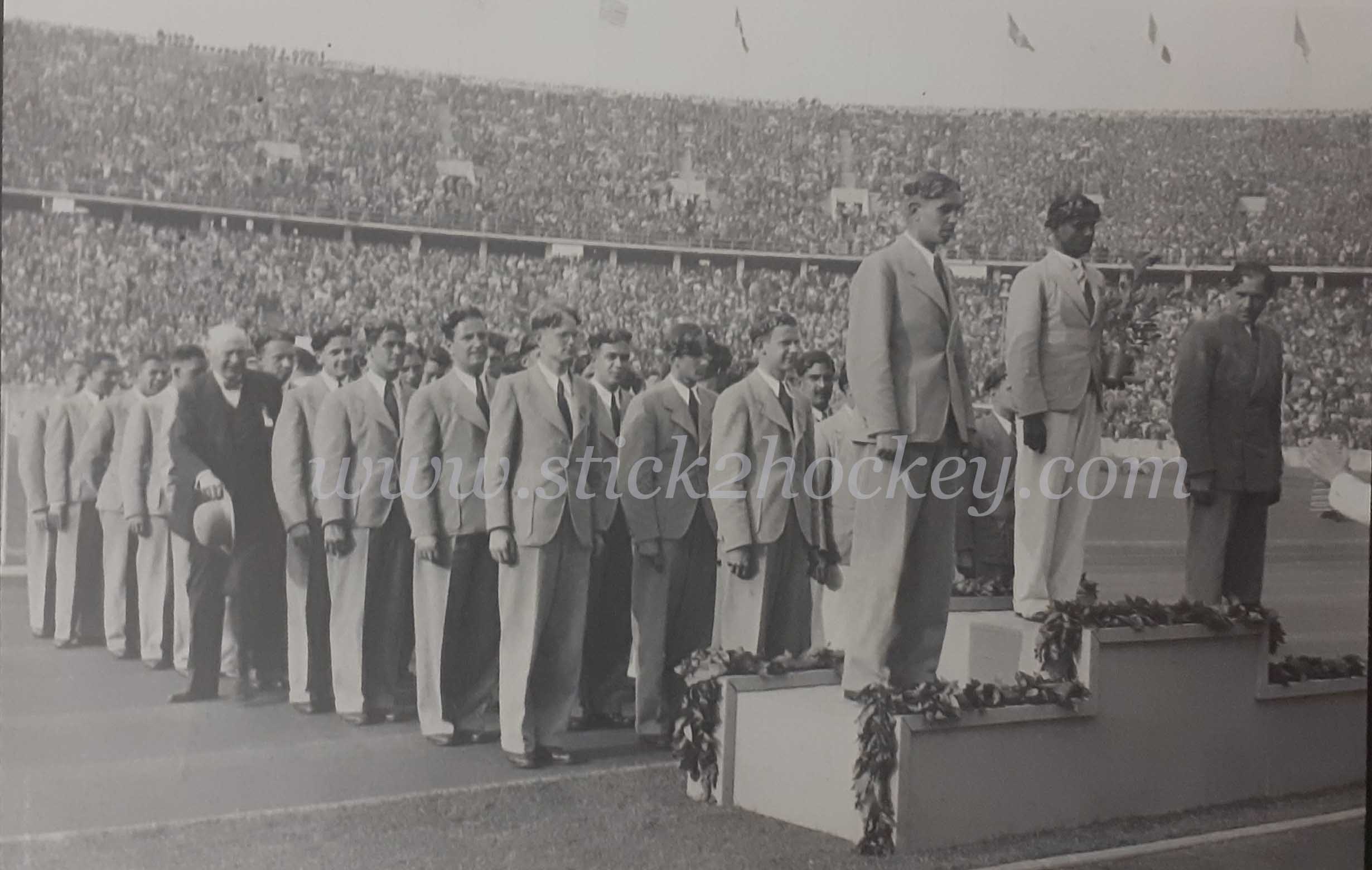
India’s glorious hockey journey – a medal in Olympics from 1928 to 1980 except once in 1976, including eight gold – would not have started but for a friendship between two British Colonels who were part of Gallipoli tragedy during the First World War.
Their friendly gesture in 1926, an Indian Army hockey team’s first tour of New Zealand – also a maiden foreign visit by any Indian hockey team, dug a bonanza. Even as the hosts were amazed at the classic hockey being showcased in front of their eyes, the visitors also realised that they were indeed a world apart.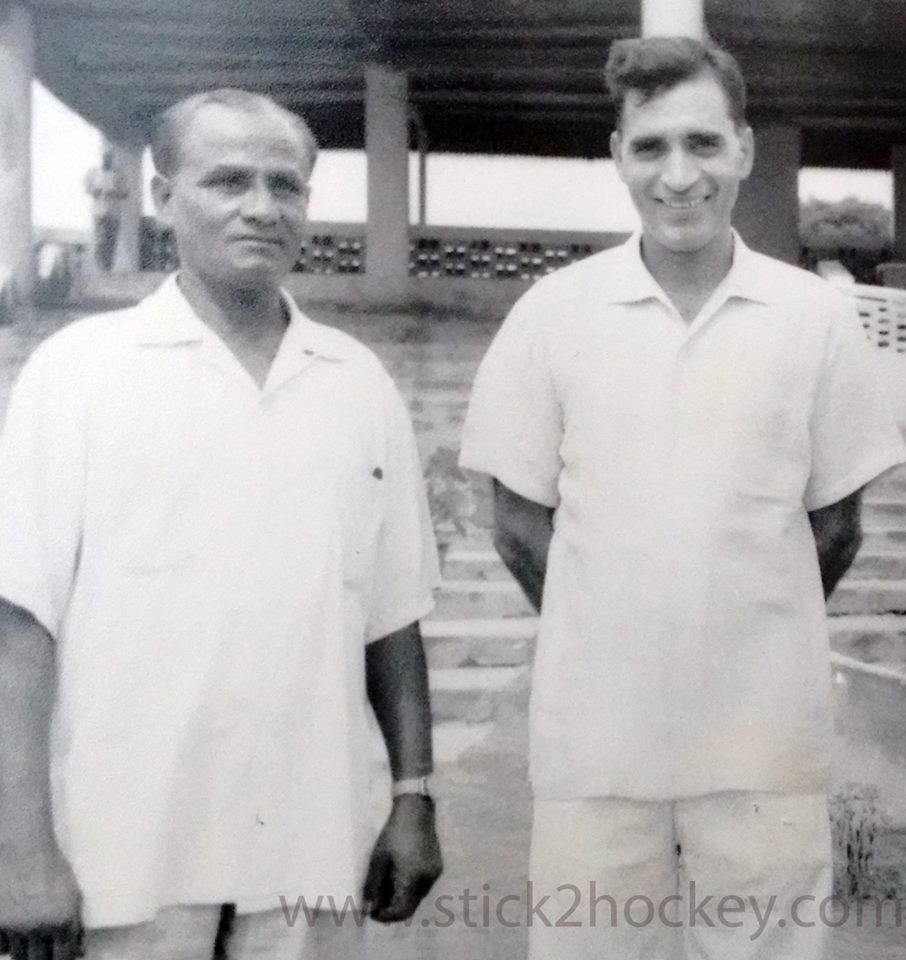
Dhyan Chand in the 1960s with the then IHF President Ashwini Kumar
One man who mesmerised the Kiwis and whose extraordinary skills spontaneously led the Indians think of taking part in the Olympics, was Dhyan Chand. In that epoch making motley group of sixteen stick artists, the 18-year old ‘Other Rank’ soldier from the Brahmin Regiment stood out. Not because he scored most goals, but for the grace and ease with which he could do them. Each of the goal he scored was hockey lesson in itself.
At the next three Olympics between 1928 and 1936, in which India strode like a colossus, Dhyan Chand lived up to his reputation, and faith reposed by the Indian Hockey Federation – it never called him for selection trials. The defending champion England, after entering the 1928 Olympics, made a hasty retreat after seeing the likes of Dhyan Chand at Folkstone Festival Hockey en route Amsterdam.
It was a rare historical occurrence when a colonial country could keep out as mighty as the British Empire from a particular sport for three Olympics. It is ironical that thte same British, 80 years later, would defeat India in the Chile qualifier and thus ensure their tormenter’s first exit from Olympic hockey in 80 years.
Jesse Owen’s exploits at the at the 1936 Berlin Olympics came for cornucopia of accolades, filling every Olympic historian’s work, as their feats were construed challenging, a worthy a rebuff to the emerging Nazi tendencies.
What about Dhyan Chand? The ‘Non Aryan’ not only had scored 20 goals in the previous two Olympics, but a mind boggling number at Berlin too, including three in the finals (Olympic records credit him with six out of eight goals that India scored in the final, but in his autobiography ‘Goal’ he claims for only three — and this honesty is greatness of this humble genius) against Germany, pricking their ego in a big way.
The global impact of Dhyan Chand needs a thorough multi-dimensional research.
Equally interesting is how this ordinary Indian, who ‘could just read and write’ — this is how he describes himself in ‘Goal’ – wrote the destiny of global hockey, while also breaking the mental block of those who managed the sports in his era.
Only hi-profile players were made the team leaders. Jaipal Singh, the 1928 Olympic captain was not even in India, but was a student at the Oxford University when he got this honour. His successor for the 1932 event, Lal Shah Bokhari, would hardly match the calibre of players in the team which includes brothers Roop Singh and Dhyan Chand and a half dozen others in their second Olympics. But the greenhorn who would later become Pakistan’s High Commissioner in Ceylon, got the nod. Neither did Jaipal nor Bokhari played their second Olympics is the case in point. Therefore, when he was made the captain for the Berlin Olympics, Dhyan Chand considered it a greater moment in his life than when he was selected for the first Olympics.
Dhyan Chand’s legacy is not just confined to pre-Independent era. It continued. After the ‘World’s Biggest Divorce’, to quote from ‘Freedom at Midnight’, when even furniture in government offices was counted and allocated between the divorcees during the Partition, strong claims were made to declare India’s three Olympic Golds neutral, like British India or Undivided India. They had a strong case. The 1936 Berlin Olympic Indian team of 18, for instance, had eight Anglo Indians, four Muslims and two Hindus from the Pakistan region. Free India won that psychological war as all of those 14 souls dwarfed against the towering dinosaur, Dhyan Chand.
And this man, oblivious of his significance, claims in ‘Goal’: I realise that am not a very important man, good enough to write an autobiography’.
Will such a soul ever cease to radiate or fail to illuminate the Indian nationhood?
The author is an expert on Indian hockey and editor of www.stick2hockey.com
Note: This article was published in India Today Special Issue ‘ 60 Greatest Indians’
The GOLD winning 1936 Indian Olympic Hockey Team :
Dhyan Chand Bais (Captain)
Richard J. Allen (Goalkeeper)
Ali Iqtidar Shah Dara
Lionel C. Emmett
Paul Peter Fernandes
Joseph Thomas Deville Galibardy
Ernest John Goodsir-Cullen
Md. Hussain
Syed Mohammed Jafar
Ahsan Mohammed Khan
Ahmed Sher Khan
Mirza Nasir-ud-din Masud
Cyril J. Mitchie
Gurcharan Singh Grewal
Babu Narsoo Nimal
Joseph Philips
Syed Shahab-ud-din
Roop Singh
Carlyle Carroll Tapsell
Stick2Hockey.com
On this day: Dhyan Chand shines in Berlin as India bags third straight Olympic hockey gold
On this day in 1936, India clinched its third successive Olympic hockey gold medal after having first won the trophy at Amsterdam in 1928 and retained it at Los Angeles and Berlin.
A packed stadium during the hockey final between India and Germany in the 1936 Berlin Olympics. - The Hindu Archives
For the third time in succession the Olympic hockey title has been won by India. India first won the trophy at Amsterdam in 1928 and retained it at Los Angeles and Berlin.
The victory over Germany is significant. Hockey on the continent had made big strides in recent years and nations were vying with one another to wrest the laurels from the holders. Germany, in particular, were all earnestness and determination to have the single honour of beating the champion nation, having the advantage of their own grounds and climate. A proof of their determination is afforded by the fact the German team which played the final had assiduous practice together for the last two years.
But the Indian team demonstrated that they were still the leading nation of the world and that in points of brainy movements, deft passing, team work, speed and finish, they have nothing to learn from any other country but really had many valuable lessons to give. The margin of their victory allows no room for argument.
TENSE EXCITEMENT
There was tense excitement when the curtain was lifted for the final this morning. The Olympic hockey stadium had a capacity crowd. It is estimated that at least 20,000 spectators paid for admission and there should have been a greater attendance, had not hundreds been refused admission for want of accommodation.
The game was packed with thrilling incidents. Fears were entertained, if the ground, which was waterlogged last evening owing to a heavy downpour, would have recovered sufficiently and whether the weather would at least be kind this morning. The fears gave way to" optimism when the sun came out brilliantly from early in the morning. But the turf was yet soft.
HOW THE GOALS WERE SCORED
Following up and down exciting hockey, India scored in the 32nd minute, Dhyan Chand netting off Jaffar's centre, a clever goal. Before this India scored once, an apparently good goal, but Dhyan Chand was pulled up for off-side. The Indian team led by one goal to nil at the interval.
In the second spell, India outplayed the Germans, who had only three openings which Allen saved well. In the 8th minute, Tapsell scored the second goal off a short corner. In the next minute, Dhyan Chand with a solo effort scooped into the net.
Dhyan Chand again netted in the next minute getting the fourth goal. Six minutes later, Weiss reduced the margin. The goal was scored palpably from an off-side position. Straight from the bully Jaffar ran and scored the fifth goal in the 21st minute. Six minutes afterwards, Dara scored the sixth and seventh goals. In the last minute, Dhyan Chand got the eighth and last goal for India.
TOURISTS' SPLENDID SHOW
The game was played at a fast pace, despite the dampness of the ground. The Germans undercut and lifted the ball, but the Indian team countered by brilliant half-volleying and amazing longshots. Twice Dara attempted to score but was declared offside. '
Dhyan Chand discarded his stockings and spiked shoes and played with bare legs and rubber soles, and became speedier in the second half.
The vigorous German attacks were brilliantly saved by Allen and Tapsell. The goal scored by Weiss was the only goal scored against the Indians throughout the tournament. The Germans were tired towards the close.
The whole Indian team put up a splendid display. Dhyan Chand and Dara impressed by their combination, Tapsell by reliability and Jaffar by his tremendous bursts of speed.
H. H. the Maharaja and the Maharani of Baroda personally congratulated the team.
THE TEAMS:
India: Allen; Tapsell and Hussain; Nirmal, Cullen and Galibardy; Shahabuddin, Dara, Dhyan Chand, Roop Singh and Jaffar.
Germany: Drose; Kemmer and Zander; Gerdes, Keller and Schmalix; Huffman, Hamel, Weiss, Scherbart and Messner.
This article was first published in The Hindu on Aug. 16, 1936)
Sportstar
Euro Hockey League FINAL8 in October cancelled
The Euro Hockey League (EHL) and European Hockey Federation (EHF), in conjunction with all our stakeholders, have taken the difficult decision to formally cancel the EHL FINAL8 which was due to take place from October 14 to 18, 2020 at the Wagener Stadium in Amstelveen.
Originally, we had mentioned September 1 as a cut-off day to make a final decision but, seeing the current situation develop and the potential variables involved, it was important to act early and decisively.
The decision comes with a heavy heart as we hoped to bring together the European hockey community in a celebration of our sport for the latest edition of the world’s best club competition.
But the ongoing difficulties created by the ever-evolving COVID-19 pandemic have made the organisation of the five-day event unfeasible. The FINAL8 was originally scheduled for Easter earlier in 2020 but was put “on hold” when the pandemic took hold, leading to this new schedule.
These October dates were announced in May with the hope we could bring together those same 16 clubs from seven countries for a memorable hockey party.
However, each country has their own different travel restrictions and regulations which makes things difficult for both ourselves at the EHL and our clubs to organise themselves in line with government advice.
As things stand currently, not all teams would be able to travel to Amsterdam, something the EHL was very keen to avoid.
Similarly, the advice in place would significantly limit our world-famous fan experience which was also a factor.
Speaking about the decision, EHL chairman Hans-Erik Tuijt said: “In the end, it just proved too difficult to guarantee that we could run an elite event in a safe environment. I am proud of the efforts of our stakeholders in trying to make it happen and have huge respect for their efforts.
“We want to say a big thank you to ABN AMRO for their ongoing support and look forward to linking up with them again next Easter when we will bring an exciting, one-off format to the EHL competition!”
EHF President Marijke Fleuren added: “We are extremely sad that we could not make this work and bring the joy of the EHL to hockey fans around Europe and beyond.
“AH&BC Amsterdam’s club members and volunteers brought so much energy and enthusiasm to the organisation of the FINAL8 both earlier this year for the original dates and for this new proposed date. For them, it is a real pity they could not see the fruits of their labour showcased but we know they will be central to future events at the Wagener Stadium.”
As announced in May, it means, for the 2020/21 season, it will not be possible to play the regular EHL Men’s KO16 event in October. As a result, three separate competitions will take place at Easter 2021:
– EHL Women’s FINAL8
– EHL Men’s FINAL12
– EHL Men’s Cup.
The EHL Women’s FINAL8 will be played over a five-day period from Thursday, April 1 to Monday, April 5, 2021. This will feature two teams from the Netherlands and Germany along with one team from Spain, England, Ireland and Belarus.
The EHL Men’s FINAL12 will run from Wednesday, March 31 to Monday, April 5 at the same venue and will consist of 12 teams from nine different countries. This will include the number one ranked team from the top nine ranked nations – Germany, Netherlands, Belgium, Spain, England, Russia, France, Scotland and Ireland. They will be joined by the second-ranked teams from Germany, the Netherlands and Belgium.
The number one seed from the top four ranked nations will receive a bye to the FINAL8. The remaining eight sides will play in four knock-out matches for a chance to join them in the FINAL8; the losers will subsequently contest ranking matches for 9th and 11th place.
The EHL Cup will feature eight teams in a knock-out format, playing three matches in four days. This competition will feature the third-ranked sides from Germany, the Netherlands and Belgium, the second-ranked sides from Spain, England and Russia and the first ranked clubs from Belarus and Austria.
The EHL Cup gives each side the chance to earn their nation important ranking points (for positions 13 to 20) which will impact future participation in the EHL.
The following season, all things being equal, the EHL Men will revert back to the KO16 in October 2021 and the FINAL8 at Easter in 2022.
Further information will be released in due course.
***
Qualification for EHL 2020/21 season is based on the EHL ranking tables. This means the entries for the 2020-2021 season are:
Men:
– Germany, Netherlands and Belgium have 3 teams in EHL.
– Spain, England and Russia have 2 teams in EHL.
– France, Scotland, Ireland, Belarus and Austria have 1 team in EHL.
Women:
– Netherlands and Germany have 2 teams in EHL.
– Spain, England, Ireland and Belarus have 1 team in EHL.
** Click here to see full ranking tables:
Men: https://eurohockey.org/download/outdoor-clubs-ranking-points-men/
Women: https://eurohockey.org/download/outdoor-clubs-ranking-points-women/
Euro Hockey League media release
National players gelling under Amin's care
By Jugjet Singh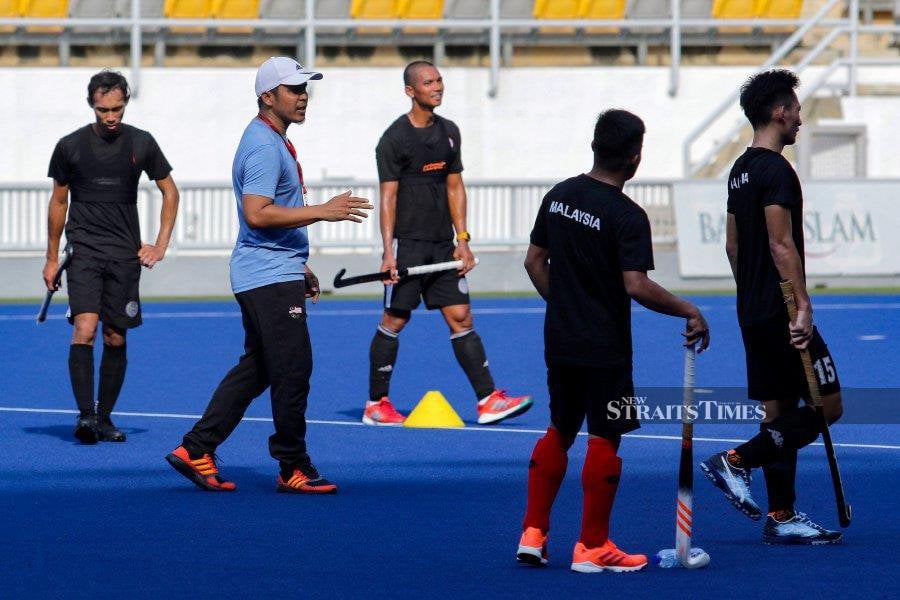
THE Malaysian senior hockey team are recovering faster than expected.
The players feel more at ease and are interacting easily with each other during training under caretaker coach Amin Rahim.
This was missing when former coach Roelant Oltmans was in charge.
"Yes, they are more at ease now," said Amin.
Amin will be handling the team until newly appointed head coach Arul Selvaraj reports for duty on Aug 26.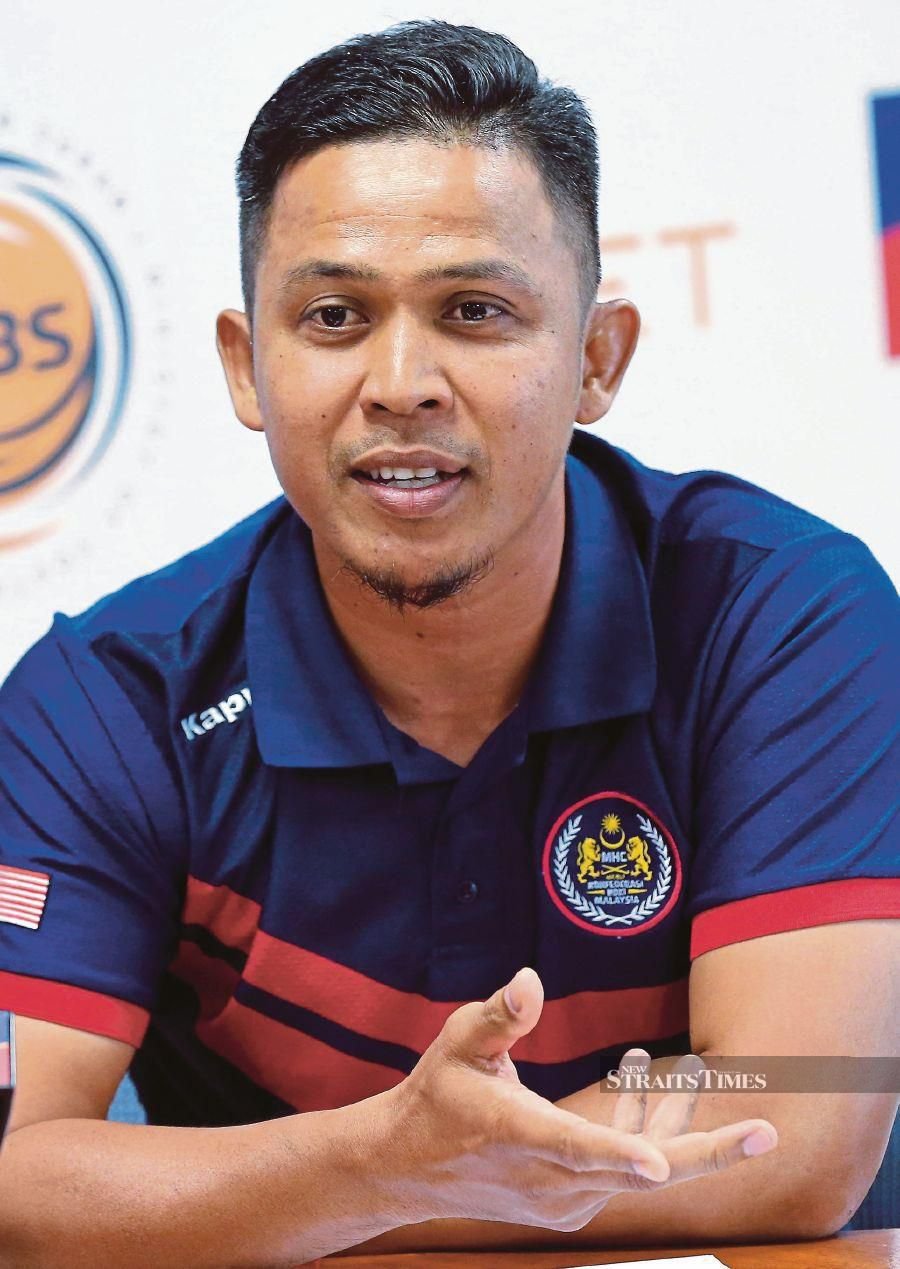
Amin Rahim
"One of the reasons could be that they are more at ease with a local coach. Arul knows all the players and this could be another plus factor when he reports for duty," said former international Amin.
Amin is still following Oltmans' training programme. However, Arul is expected to have his own plans when he starts coaching the team.
"After speaking to Arul, who is under quarantine, we agreed to follow Oltmans' programme. Once he takes charge, he will have his ideas," Amin added.
The national team are preparing for the Asian Champions Trophy in Dhaka in November.
New Straits Times
PHF holds exhibition hockey match to mark Independence Day
LAHORE - Pakistan Hockey Federation (PHF) on Friday held an exhibition hockey match to celebrate the 73rd Independence Day here at the National Hockey Stadium.
The match was played between Brig MH Atif XI and Brig Abdul Hameed XI.
POA Secretary Khalid Mahmood and former PHF chief Akhtar Rasool graced the occasion as guests of honour.
Before the match, Khalid Mehmood, Akhtar Rasool and PHF Secretary Asif Bajwa planted a sapling in the lawn of National Hockey Stadium and cut a cake to mark the Independence Day.
The Nation
Hockey star Martin turns back the clock to reflect on Olympic journey
Hockey - Gold Coast 2018 Commonwealth Games - Women's Bronze Medal Match - England v India - Gold Coast Hockey Centre - Gold Coast, Australia - April 14, 2018. England players celebrate after winning the match. REUTERS/David Gray
Hannah Martin has been getting up to all sorts in lockdown but reckons a blast from her Ipswich School past tops the lot.
The Great Britain hockey ace has spent the lay-off disseminating expertise to current students at her old school via Zoom, also playing a key role in the Women’s Sport Trust's ‘Unlocked' campaign and helping Flyerz Hockey keep active.
Holbrook-based Martin spent the majority of lockdown in Addington with her boyfriend, Sam, staying fit through a hybrid of picturesque bike rides through the Yorkshire Dales and pounding the pavements in the White Rose county.
But Martin has loved getting a taste of nostalgia as she shared her advice to fledgling hockey stars bidding to follow in her footsteps.
“I went to Ipswich School for 15 years and it’s absolutely important to help, inspire and pass guidance on to the next generation,” Martin, one of 1,100 athletes supported by The National Lottery through UK Sport’s World Class Programme, said.
“Ipswich School was incredible for me and I wouldn’t have played hockey if I hadn’t gone there, so I’ve got a strong affinity with the school!
“I always want to help out whenever I can and it’s great to see how dedicated and interested the sixth form girls are in all aspects of hockey.
“It’s just great to share any insight I can and if I can inspire people along the way, then it’s fantastic.
“And the Women’s Sport Trust's 'Unlocked' campaign is incredible – we’ve come together to really enhance the visibility of women’s sport and promote it as much as possible.
“We want people to see female athletes out there and inspire people to play sports, so we’re trying to change society for the good and that’s all incredibly inspiring.
“I’m so incredibly proud, honoured and humbled to be alongside so many incredible women - there’s a real sense of unity and we’re trying to drive women’s sport into a good place.”
National Lottery funding played a central role in Team GB’s thrilling women’s hockey gold in Rio in 2016, as Kate Richardson-Walsh’s side toppled the Netherlands in a memorable penalty shoot-out.
And that crowning glory was just one of 864 medals secured at the Olympic and Paralympic Games since 1997, with the injection of National Lottery funding 23 years ago ushering in an unprecedented epoch of success.
Martin watched that breath-taking final from Surbiton Hockey Club as a precocious 21-year-old, further igniting her passion for glory and fuelling her desire to make the team in Tokyo.
Britain have been drawn in a group with the Netherlands, Germany, India, Ireland and South Africa next summer and Martin can’t wait to set foot on the plane and defend her team’s title.
“I remember watching us win in Rio and it was unbelievable – I got utter goosebumps and the unity of the squad really shone through,” she added.
“To now be part of that squad is so special and I treasure it every day – we’ll be going to Tokyo to defend our title, and the postponement of the Games is a massive opportunity for us to gel and develop even further.
“I count my blessings every single day for the opportunity I have through The National Lottery - everyone who buys a ticket allows our success to happen, so me and the whole squad are so massively grateful.”
Yahoo Sports
Athlete Spotlight: Linnea Gonzales
Each athlete that wears the red, white and blue has a unique story to how their careers came to fruition. From the junior level to the senior squad, USA Field Hockey is putting national team athletes under the spotlight to share their journeys.
Sports brings opportunities and lifelong lessons one cannot gain from anywhere else. Linnea Gonzales knows this all too well through her young career thus far as an athlete on the U.S. Women’s National Team, and shows no signs of yielding to these challenges any time soon! 
Like many elite athletes, Gonzales was introduced to the game through family, specifically her sister, at the age of seven. Originally playing soccer, she ultimately never looked back from field hockey once she wanted to follow in her sister’s footsteps.
High school life at times was a blur for the Bel Air, Md. native as Gonzales juggled the sport as a four-year varsity athlete for Patterson Mill High School, club play with H2O Field Hockey and Futures.
“It definitely kept me busy, but I had a lot of fun competing and learning from different programs, teammates and coaches,” said Gonzales. “It also helped me gain exposure to college coaches and progress within Futures.”
Gonzales helped Patterson Mill to the state finals as a junior in 2013. That same year, she racked up a number of honors, including being named First-Team All-American, Baltimore Sun All-Metro Player of the Year, Baltimore Sun All-Metro Team, All-State Team and All-County team.
She holds countless memories as a member of H2O, including taking home three medals from the National Indoor Tournament.
“Club life with H2O was great all around,” continued Gonzales. “The program has elite coaches who are passionate for the game and their players. I was fortunate enough to be surrounded by fun, competitive and dedicated teammates. We had the best memories and experiences together, all in midst of competing and growing as a team. I am very grateful to have been a part of this club.”
When it came time to think about college, the University of Maryland was a natural fit for Gonzales, who fell in love with its family culture and athletic passion on the pitch.
“Maryland is not only elite in academics, they are also highly competitive in the sport of field hockey,” continued Gonzales. “Missy Meharg is a tremendous leader who deeply cares for her players on and off the field. She has taught me a lot both as a player and a person. Once a ‘Terp always a ‘Terp!”
Gonzales continued to add to her individual honors from 2015-18 as a Terrapin, including Big Ten Freshman of the Year, First-Team All-Big Ten Team (2017, 2018), Big Ten Player of the Year (2018) and National Field Hockey Coaches Association (NFHCA) National Player of the Year (2018). She also helped lead Maryland to back-to-back Division I National Championship appearances. While competition was fierce on the college level, she was no stranger to the Olympic Development Pathway.
To her, it has been the biggest trek of them all to where she stands proudly today with Team USA.
Gonzales was named to the U.S. U-17 Women’s National Team in 2013 and 2014, as well as the U-21 USWNT in 2015 and 2016. In between these milestones were times when her name wasn’t part of final roster. When it wasn’t in the cards, Gonzales used it as motivation to drive further. Being part of Futures and the Olympic Development Pathway is an accomplishment in of itself but being rejected once, or more than once, doesn’t mean one’s dream is quashed. It is part of the process for anyone with the dream of becoming an elite-level athlete.
“The Olympic Development Pathway has been a journey,” said Gonzales. “I was involved in Futures from a young age. With this competition came ups and downs of being selected for teams and not being selected. Through this journey of ever-growing improvements, I have had the privilege to represent the red, white and blue for the USWNT.”
In 2018, Gonzales was named to the U.S. Women’s National Development Team and went on tour in June to compete in USA’s tour of Argentina. About six months later, she was selected to the senior USWNT roster and earned her first international cap on January 27, 2019 against Chile, ahead of USA’s upcoming campaign in the inaugural FIH Hockey Pro League season. It was another memorable moment along her field hockey career which was helped by the support of her teammates, something Gonzales will always cherish.
She has since become a well-recognized face on the field throughout USA's run through both seasons of the FIH Hockey Pro League so far, as well as the 2019 Pan American Games and 2019 FIH Hockey Olympic Qualifier.
All in all, field hockey is more than a game to Gonzales, be it past, present or future.
“This sport has given me tremendous opportunity,” said Gonzales. “The opportunity to play the game I love, the opportunity to meet and learn from different people, to be challenged and to grow as a player and person. The opportunity to compete at the highest level and to represent my country, giveback and grow the game. Field hockey is more than a game, the journey and process are just as special to me.”
USFHA media release
Arjuna Award: Gender disparity is ominous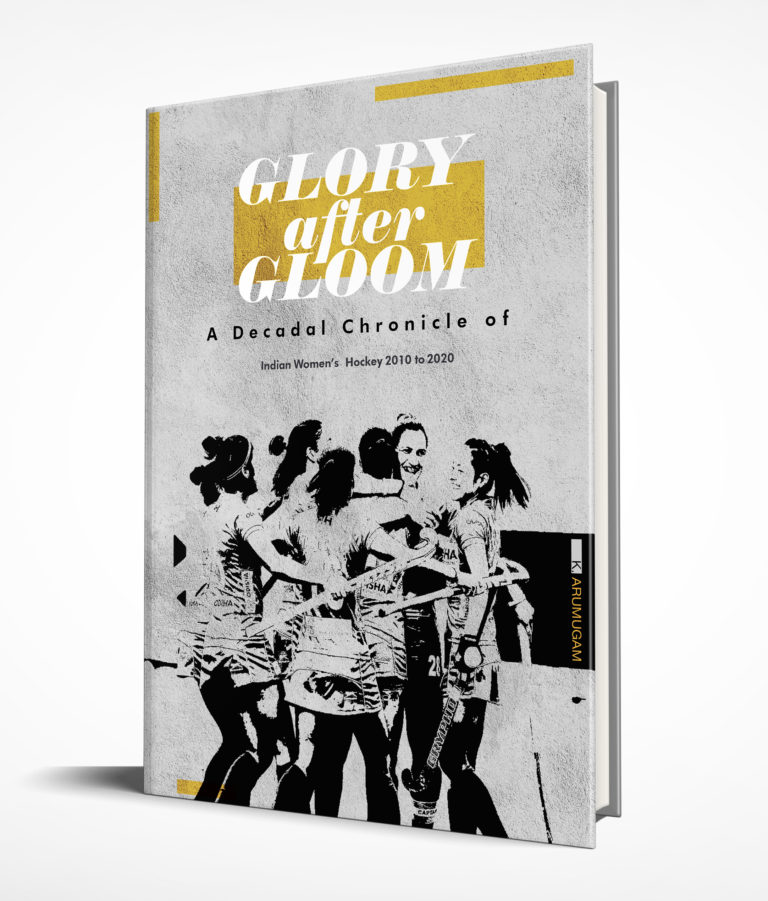
This article is the last chapter of Glory after Gloom book authored by K. Arumugam
Up until 2018, 85 deserving hockey players have been bestowed the Arjuna honour. The nation salutes their achievement in unison. There is no second opinion on that. Everyone deserves the nation’s honour.
True, there was always debate, actual or contrived, subtle or coarse, as to the selection process, suitability of the odd selection or omission. But this is beyond the scope of this work.
However, we need to journey through these awards from the women’s perspective. An exercise to discern whether or not women players have got their due.
Of 85 players who were conferred the honour till May 2020, 23 are women – less than a third.
Women’s hockey was flourishing as much as men’s at the time of inception of the award. The women’s game had its own administration, had rights to selecting teams and conducting tournaments and enjoyed government patronage.
Women, however, played fewer tournaments than their male counterparts. It was plain to see why. The men had a bigger and larger platform such as the Olympics and Asian Games on which to perform and achieve laurels.
A level playing field, therefore, did not exist.
Even allowing for greater opportunities open to the men, it’s perplexing why women did not feature in the awards’ list for long spells often spanning a decade.
For instance, for 13 years between 1985 and 1997, more than a dozen hockey players received the Arjuna award but there was no women in the list. Ironically, this was a period during which the men’s team found itself in the wilderness.
The men had no Asian Games or Asia Cup gold medals in the cabinet. They even finished with the wooden spoon at the 1986 World Cup and subsequently missed the elitist Champions Trophy often during this period. The fall from grace did not prevent male players stepping up and receiving the prestigious award.
Deepika did not get the Arjuna Award, despite fully deserving
That could be attributed to several factors that went into the selection of players for the award. It included:
- The overall sports scenario of the nation,
- Individual excellence even in an otherwise gloomy scene,
- Weightage for sports’ heritage and motivation to uphold it by GenNext.
Sadly, those considerations, patronage or whatever, were not extended to the women. It was unfair to say the least.
The ladies team entered the 1998 Asian Games final to break the 13-year jinx of not a single women hockey player chosen for the award. Its captain Pritam Siwach was awarded the Arjuna. Which was all very well received. Pritam Siwach has applied for Dronocharya Award this year.
But a look at other leading women powers in Asia – South Korea, China and Japan – revealed the wide gap in fortunes. The above trio of nations bid for the Asian Games and Olympics and in its wake spent princely sums on teams which included women’s hockey to ensure a good performance at home.
The Indian eves did not enjoy the contextual advantage and it manifested itself in stiff competition in Asia itself. The big picture did not weigh in on the panel selecting awardees.
In five years between 1995 and 2000, as many as 20 male hockey players were chosen for the award, making it an average of four per year. During the same period, just three women were chosen for the Arjuna award (Pritam Siwach, Omana Kumari and Tingonleima Chanu).
Half of the male awardees were old guards who missed out in the past. But the ladies were denied such consideration.
Had women’s hockey been appreciated, the likes of Sanggai Ihembal Chanu, Sandeep Kaur, Manjinder Kaur and Deepika Murthy could have got their due in terms of the award.
To segregate former players from the present, a separate category called Life Time Achievement in the name of Dhyan Chand was created. Till date eight hockey players were given the honour but that group included just one woman Sumrai Tete.
There were other women players who merited keeping Sumrai company in the list and the names of Subhadra Pradhan and Kirandeep Kaur come to mind.
Let bygones be bygones.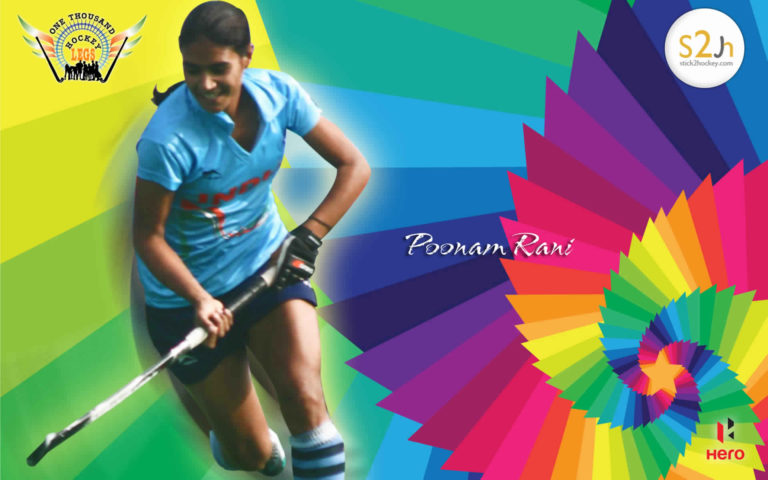
A old wallpaper of Poonam when she was in her prime
But was the situation any different in the decade being discussed?
The 10 years that have elapsed saw men’s and women’s hockey administered by a single entity. It meant parity in terms of government grants, access to platforms such as continental, invitational and bilateral events and positioning in the hockey world. Save the fact that very few tournaments were organized for the women at home, most other factors were evenly balanced for both genders.
As a result, the women’s team did duty around the year unlike the past. Their participation in international tournaments and bilateral matches increased. But they still lagged behind by at least one-third.
Both men’s and women’s hockey produced stars in the contemporary scene. There was more continuity in women’s team composition than men’s, resulting in long careers of a committed core of women. Doesn’t the Arjuna award exist to celebrate such extraordinary commitment and achievement by such elite athletes? Why then have there been some glaring cases of cruel omission?
Ritu Rani, a stand-out player, is one such.She donned India colours for 12 solid years, anchoring several victories. Ritu also captained India for six years including a record 22-plus tournaments and test series.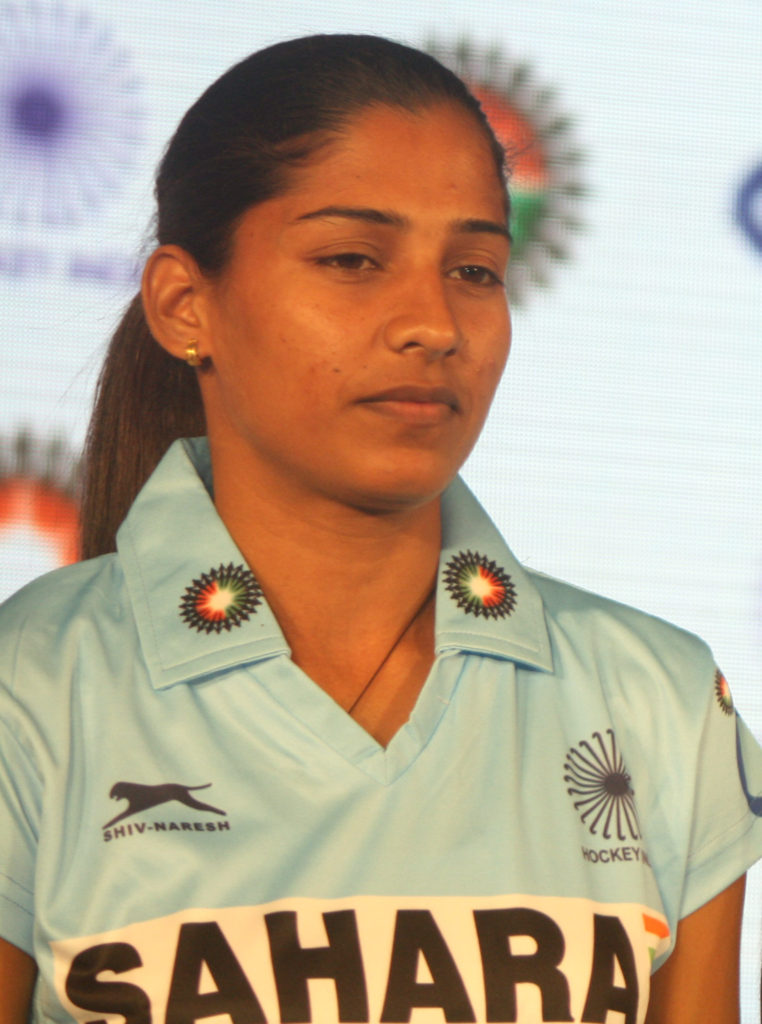
Former Indian captain Ritu Rani, a glaring miss out
Deepika Thakur is a classic case. Since making her international debut in 2004, she represented India a record 15 years till the end of 2018. In the process, she collected a record 230 India caps.
Poonam Rani, a forward, figured in 30 campaigns for India. An illustrious career that spanned 11 years during which she took injury-induced layoffs just three times. By the time she was forced to retire, she had collected 195 caps. She was rendered no compassion or consideration to enter the 200 Club for which she needed to play a mere five more matches.
Only the iconic Rani Rampal and the recent goalkeeping sensation Savita Punia were bestowed with the Arjuna. It was a moment to rejoice for women’s hockey but apprehensions continue in the disparity existing between the genders when it comes to the awards.
Deep Grace Ekka, like her compatriot Savita, collected her 200th cap in 2019. The 24-year-old has fire in the belly and can bid her time for the Arjuna. Vandana Katariya is two years older and debuted earlier than Ekka. She crossed the 200 milestone a year ago. She too awaits her moment. But here lies the catch.
A rough scrutiny of data reveals the stark reality between genders in the Indian hockey scene.
A men’s hockey player of the same continuity takes an average of just seven to eight years to cross the 200 milestone. A woman player takes 10-11 years, almost one third more, despite continuity arising from fewer tournament opportunities than their male counterparts. It is implicit therefore that women have to retain their places in the team longer, maintain fitness for years more, endure being away from homes longer and bear sporting anxiety and psychological stress that go with playing a sport at the highest level even more.
Ultimately, you perform similar feats that the men do, but in double the time because of the relative paucity of opportunity.
And, we are not talking about other cultural and societal disadvantages that the womenfolk encounter.
Men’s captain Manpreet Singh collected his 200th cap in only six years. He debuted in October 2011 and reached the above milestone in December 2017). His is a classic case, though other men took a year or more. Sardar Singh, Chinglen Singh Sana and Gurbaj Singh reached the 200th club in seven to eight years.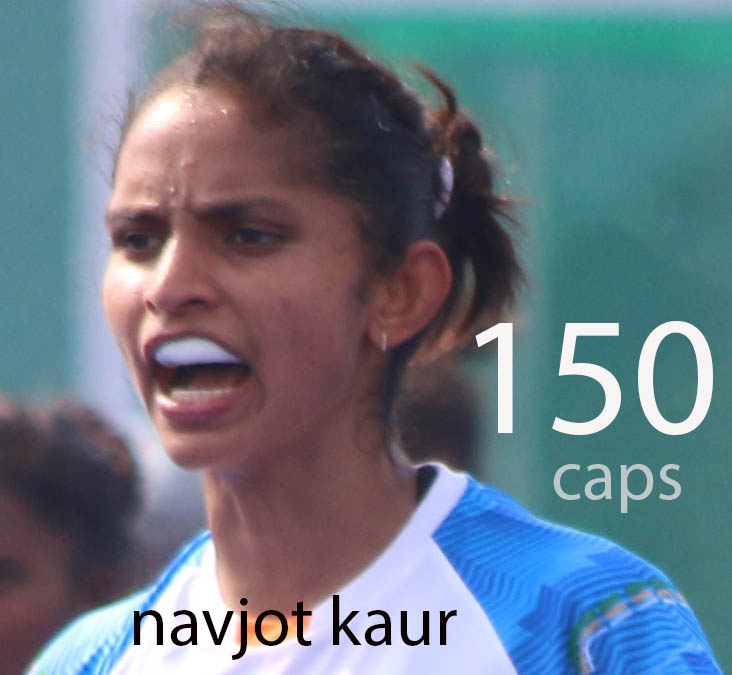
The likes of Lilima Minz, Navjot Kaur, Namita Toppo and Monika would have played 200 internationals had they got the opportunity to play the same number of tournaments, as say, Manpreet Singh or Chinglensana Singh. For a woman hockey player to achieve 200 caps, it takes almost half the time more the time, for some players even twice the time.
These players are hardly dropped or rested, but India itself plays fewer tournaments compared to men. Still, the eves have stood the test of time, endured long careers with commitment and focus on their way to 200 caps. Theirs was a commitment to the concept of hockey being a team sport.
To these indefatigable women warriors, came a feeling of victory if the team won. And that of defeat if it lost.
There was no shortage of commitment, effort or sacrifice. The women always gave it their all. Their endeavours may not have resulted in as many medals as the men’s team have won – partly stemming from the greater number of international tournaments they played.
Could that be the reason the women picked up fewer Arjuna awards than their male counterparts? Is this why the Deepikas, Ritus and Poonams are being denied the Arjuna award? Vandana Katariya and Deep Grace Ekka soldier on, however, their prospects of bagging the honour may come in a year or two, but as of now hang in balance.
Are we, as a society, fair to these exemplary athletes?
Excerpt from the book GLORY AFTER GLOOM: A Decadal Chronicle of Indian Women’s Hockey 2010 to 2020. Available on Amazon.in by clicking the link
Stick2Hockey.com
Hard work pays off as Scots officials appointed to European competitions
Scottish officials are continuing to flourish on the international stage with a number of European appointments recently announced, rewarding their hard work and dedication.
Further to the list of Scottish appointments, Scotland’s Dr Katie Howie has been accepted into group 14 of the EHF Elite Umpires Development Group, which begins in Oct (covid-19 permitting) and is great reward for Katie’s excellent progress.
On 12-14 Feb 2021 at the women’s EuroHockey Indoor Club Cup in Almere, the Netherlands, Anne Wotherspoon has been appointed as TD while at men’s EuroHockey Indoor Club Trophy in Almere, Ged Curran has been appointed as Umpire Manager.
At men’s EuroHockey Indoor Club Challenge I in Puconci, Slovenia, Alistair Dick will be TO and Jean Duncan will be Umpire Manager. Greig Cunningham has also been appointed as an umpire at the tournament.
Men’s EuroHockey Indoor Club Challenge II in Oslo will see Scotland’s Scott Baird as TD and at men’s EuroHockey Indoor Club Cup in Alanya, Turkey, Alex Fedenczuk has been appointed to umpire.
On 19-21 Feb 2021, Women’s EuroHockey Indoor Club Trophy will be held in Siauliai, Lithuania, with Caroline Ellice appearing as an Umpire while at Women’s EuroHockey Indoor Club Challenge in Sveti Ivan Zelina, Croatia, Victoria Truesdale has been appointed.
Officials Convenor Barbara Morgan said, “The IAP Chair John Heron and myself are very pleased that a number of our umpires and officials have been selected for European indoor tournaments.
“It is testament to the hard work and dedication of our umpires and officials in Scotland. We wish them every success in their tournaments and are hoping that all events will go ahead next year.”
John Heron added, “It’s a fantastic honour that our officials are being recognised for their ability and rewarded for personal commitment.”
Scottish Hockey Union media release
Job Opportunity – Canadian Men’s National Team Head Coach
Working in collaboration with a variety of partners, Field Hockey Canada is the national sport governing body responsible for the development, growth and promotion of field hockey in Canada. Among its responsibilities, Field Hockey Canada selects, prepares and promotes Canada’s teams for international competitions including FIH Competitions, PAHF Continental Championships and major multi-sport games (e.g. Olympic Games and Commonwealth Games).
Field Hockey Canada seeking a Head Coach for the Canadian Men’s National Team. Reporting to the High Performance Director, the Head Coach is responsible for athlete preparation, team competition, program planning and management, with an emphasis on strong collaboration through stakeholder engagement and ongoing communication. In collaboration with the High Performance Director, the Head Coach is responsible for the design, content and implementation of a comprehensive training, competition and monitoring program for the Men’s National program.
This position is currently based in Canada and involves extensive travel.
Qualifications
Skills / Background:
- Evidence of world-class field hockey coaching experience, ideally with a successful track record of coaching at the international level;
- Proof of the ability to work effectively within a team, possessing excellent planning, interpersonal, management and organizational skills, with the ability to collaborate with and inspire others;
- Strong engagement and communication skills;
- Experience integrating medical, sport science and technology support within a team environment;
- Innovative approach to coaching with an appreciation of past success and the ability to draw knowledge from other sports or fields to achieve excellence;
- Evidence of commitment to developing effective partnerships to support the national program’s mission.
Education:
The successful candidate will have a demonstrated commitment to coach education throughout his/her career. Evidence of having completed, or being in the process of imminently completing, coach certification at the highest national level is required. An academic degree(s) is considered an asset.
Application:
If you have a passion for working with high performance athletes and collaborating with a variety of stakeholders and believe you posses the appropriate experience and skill set for the position, please submit your resume and covering letter that includes the top 3 reasons why you are the ideal candidate for this position.
Applications are to be submitted electronically by September 1, 2020 to Chief Executive Officer: Susan Ahrens at This email address is being protected from spambots. You need JavaScript enabled to view it..
Field Hockey Canada is committed to employment equity and encourages applications from all qualified candidates. In addition, Field Hockey Canada is committed to providing accommodation for people with disabilities. If you require accommodation, we will work with you to meet your needs.
We appreciate your interest, however, only those applicants who are selected for an interview will be contacted.
DOWNLOAD FULL JOB DESCRIPTION
Field Hockey Canada media release
Job Opportunity – Canadian Women’s National Team Head Coach
Working in collaboration with a variety of partners, Field Hockey Canada is the national sport governing body responsible for the development, growth and promotion of field hockey in Canada. Among its responsibilities, Field Hockey Canada selects, prepares and promotes Canada’s teams for international competitions including FIH Competitions, PAHF Continental Championships and major multi-sport games (e.g. Olympic Games and Commonwealth Games).
Field Hockey Canada is seeking a Head Coach for the Canadian Women’s National Team. Reporting to the High Performance Director, the Head Coach is responsible for athlete preparation, team competition, program planning and management, with an emphasis on strong collaboration through stakeholder engagement and ongoing communication. In collaboration with the High Performance Director, the Head Coach is responsible for the design, content and implementation of a comprehensive training, competition and monitoring program for the Women’s National program.
This position is currently based in Canada and involves extensive travel.
Qualifications
Skills / Background:
- Evidence of world-class field hockey coaching experience, ideally with a successful track record of coaching at the international level;
- Proof of the ability to work effectively within a team, possessing excellent planning, interpersonal, management and organizational skills, with the ability to collaborate with and inspire others;
- Strong engagement and communication skills;
- Experience integrating medical, sport science and technology support within a team environment;
- Innovative approach to coaching with an appreciation of past success and the ability to draw knowledge from other sports or fields to achieve excellence;
- Evidence of commitment to developing effective partnerships to support the national program’s mission.
Education:
The successful candidate will have a demonstrated commitment to coach education throughout his/her career. Evidence of having completed, or being in the process of imminently completing, coach certification at the highest national level is required. An academic degree(s) is considered an asset.
Application:
If you have a passion for working with high performance athletes and collaborating with a variety of stakeholders and believe you posses the appropriate experience and skill set for the position, please submit your resume and covering letter that includes the top 3 reasons why you are the ideal candidate for this position.
Applications are to be submitted electronically by September 1, 2020 to Chief Executive Officer: Susan Ahrens at This email address is being protected from spambots. You need JavaScript enabled to view it..
Field Hockey Canada is committed to employment equity and encourages applications from all qualified candidates. In addition, Field Hockey Canada is committed to providing accommodation for people with disabilities. If you require accommodation, we will work with you to meet your needs.
We appreciate your interest, however, only those applicants who are selected for an interview will be contacted.
DOWNLOAD FULL JOB DESCRIPTION
Field Hockey Canada media release
Field Hockey Canada Hall of Fame Inductee – Dr. Jack Taunton
By Josh Rey
‘Dr. T’ goes into the hall as a a legendary doctor and dedicated community community member
Dr. Jack Taunton credits his work with Field Hockey Canada for getting him started on what would become a legendary sports medicine career.
Dr. Taunton has been involved with field hockey in Canada as a sport medicine doctor for over 40 years. Alongside other impactful builders, athletes and officials, he will be inducted into the Field Hockey Canada Hall of Fame in the Builder Category.
He considers himself fortunate to have worked as the women’s national field hockey team’s physician for about 24 years. According to Dr. Taunton, supporting the team in 1979 at the World Championships kick-started his career in sports medicine.
“Really, field hockey started me on my sports medicine career that year,” he said. “ I did the World Championships with field hockey, I went to the world’s aquatic swim championships and an outdoor meet in Berlin and I went to the world student games in Mexico City. And I guess I had done well, because they selected me, along with the recommendation of field hockey to be the chief medical officer for Caracas [Pan American Games] ahead of 84.”
Dr Taunton is no stranger to being awarded for his success. He was inducted into the B.C. Athletics Hall of Fame in 2011 and the B.C. Sports Hall of Fame in 2014. Dr. Taunton has a long history with sports in B.C. and not just field hockey. He is a professor of emeritus at UBC and there he taught in the Faculty of Medicine and School of Kinetics. Ever since he was young, he knew sport medicine was very important. He contracted polio at seven and was in a bike-car collision at 15 but he made a full physical recovery due to extensive physiotherapy and his passion for sports grew.
In 1971, Dr. Taunton co-founded the Lions Gate Road Runners with his wife Cheryl, in 1971. It was the first road running club in Canada. From there, they began to organize numerous races in Stanley Park, including the BMO Vancouver International marathon. In 1985, they both joined with Doug and Diane Clement, and transformed a race called the Lions Gate Eight into what is now the Vancouver Sun Run.
Dr. Taunton also founded the Allan McGavin sports medicine centre and was a medical officer for numerous Olympic Games including Barcelona 1992 and Vancouver 2010.
“It was a tremendous honour to work with men and women’s field hockey [teams] for close to 30 years,” said Dr. Taunton. “When we moved Sportsmed, Doug Clement and I started sports medicine in Richmond and then we had the opportunity to move out to UBC. We were in the field house as it were, we converted it into a sports medicine clinic 50 feet from where the World Championships were going to be in 1979 and it was the last time field hockey was played on grass.”
Dr. Taunton has countless fond memories of working with the women’s national team as they rose through the rankings in the 1980s and became one of the best teams in the world. Dr. Taunton is a dedicated professional to the sport of field hockey and without a doubt has earned the honour to be inducted into the hall of fame.
Click here for a presentation and interview with Dr. Jack Taunton
Field Hockey Canada media release
New President of Hockey Wales announced.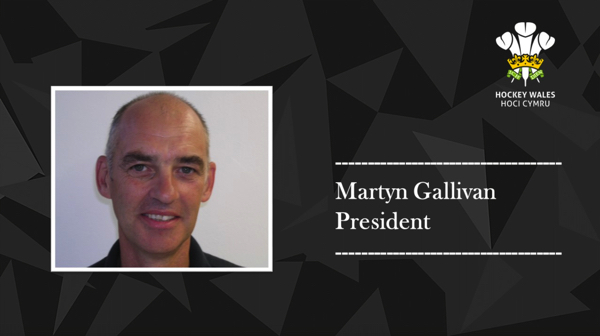
Hockey Wales is delighted to announce that Martyn Gallivan was elected President of the National Governing Body at the recent General Meeting.
The President is the figurehead of the organisation, representing Hockey Wales at meetings, events and internal and external functions, acting as part of the organisations interface with members as well as being an ambassador and advocate for hockey in Wales and facilitating effective relationships across GB hockey.
Martyn’s first involvement with Welsh hockey was in 1975 when he became a member of WHUA and was a volunteer helper at an international tournament organised by his club. He went on to become an international Grade 1 umpire for both Outdoor and Indoor Hockey.
As a volunteer he has gone on to hold numerous roles within the sport, including a committee member of former Welsh Hockey Association coaching, umpiring and competitions committees.
Martyn brings a wealth of experience to the role through his work on various local, national and international committees.
In 1994 he was invited to join EHF’s Competitions Committee, taking on the responsibility of organising and managing EHF’s club competitions. He went on to become the Secretary of that Committee and also served on EHF’s Appointments Committee for several years. Martyn has also served as independent member of the GB Hockey Performance Officiating Panel.
It was in 2010 when Martyn was appointed FIH’s Competitions Manager, a position held for 10 years working closely with National Associations and Continental Federations, establishing close working relationships with professional, performance and managerial staff.
Talking about his recent appointment Martyn explained how he felt about becoming the second President of Hockey Wales, and his ambition for the role,
“I am both honoured and delighted to have been elected as President of Hockey Wales and am very aware that I have the privilege of following Anne Ellis (HW President 1996 – 2016) in the role.
“To support the organisation’s ambition to deliver world-class hockey experiences, I will use my knowledge and passion for the game to ensure that Welsh hockey is at the forefront of discussions and decisions on the international stage.
“This is a wonderful opportunity that I truly value and would like to thank everyone who has supported me.”
Congratulations Martyn and good luck from all at Hockey Wales.
Hockey Wales media release
Obituary: David Wilman
David Wilman with Helen Richardson-Walsh
Great Britain Hockey is saddened to hear of the passing of former Olympian and Cambridge City Hockey Club Vice President David Wilman, known affectionately as “Olympic Dave” at the club.
Not only was Dave an ever-present on the club’s social media channels, he was also always found at training until quite recently, warming up with everyone else, taking part in every drill and took each game seriously no matter the level. Off the pitch he was always available for a chat, a beer and had the most iconic smile.
Dave played for Cambridge City well into his 70s and would turn up for whoever needed him, wherever they were playing. He was a real club player.
He was known as Olympic Dave for good reason! Dave represented Great Britain in the 1960 and 1968 Olympics. He wouldn’t bring this up very often, but invariably it came up when new players met him for the first time as they were astounded by his control and competitive spirit and felt compelled to ask about him.
When Dave did speak of his Olympic experiences the pride was there for all to see. He was delighted to speak with the likes of Helen and Kate Richardson-Walsh and compare notes on how different things were across the generations.
Cambridge City HC President, Tim Ireland, summed up David by saying: "David was a sportsman of the classic variety. Competitive and as hard as nails on the pitch but a true gentlemen off it. He will be remembered with much fondness by the hockey community. Our thoughts are with his family and friends."
On behalf of all at GB Hockey, our condolences go to Dave’s family as well as our gratitude for all he did within the world of hockey.
Great Britain Hockey media release


